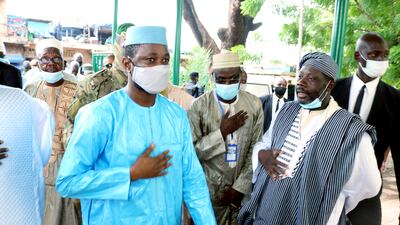Mali has opened an inquiry into an attempt to assassinate the country's military leader, Col Assimi Goita.
He was taken to safety when a man armed with a knife lunged at him after Eid Al Adha prayers at the Grand Mosque in the capital Bamako.
Prosecutor Bourama Kariba Konate said “an ill-intentioned individual tried to physically harm” Col Goita and the incident “comes under the categories of harming state security and attempted murder".
Col Goita, who was behind two coups in less than a year, later appeared on state TV and said he was doing “very well” and played down the significance of the attack.
“That’s part of being a leader. There are always malcontents. There are people who at any time may want to try things to cause instability,” he said.
A man who worked as a teacher remained in custody on Wednesday while police interviewed witnesses, commissioner Sadio Tomoda said.
Bamako was calm after the incident. Wednesday was a public holiday to mark Eid Al Adha.
The attack capped months of political turmoil in Mali, which has rarely enjoyed stability since gaining independence from France in 1960.
Col Goita, a special forces officer in his late thirties, led a putsch last August that ousted president Ibrahim Boubacar Keita after weeks of protests against domestic corruption and the insurgency spreading across the Sahel region.
After facing international condemnation, the junta handed power to a civilian-led transitional government that promised to restore civilian rule in February 2022.
But in late May, Col Goita, who was vice president under the transitional government, removed president Bah Ndaw and prime minister Moctar Ouane, accusing both of trying to sabotage the handover.
In June, with Col Goita serving as interim president, a new government was appointed, with military figures in key roles.
Under increasing pressure from the African Union and the West African regional bloc Ecowas, Col Goita vowed the government would “uphold all its commitments” and “credible, fair and transparent elections” would take place.
Mali’s neighbours and allies are concerned about the situation, fearing its effect on efforts to stem the regional insurgency.
Violence erupted in northern Mali in 2012 and spread to Burkina Faso and Niger. Thousands of soldiers and civilians have been killed and hundreds of thousands have fled their homes.
France, a key member of the counter-extremist operation, has been especially critical of the military takeover in Mali.
It suspended military co-operation after the second coup and has announced that about 2,000 of its 5,100 troops in the Sahel will be withdrawn this year.

